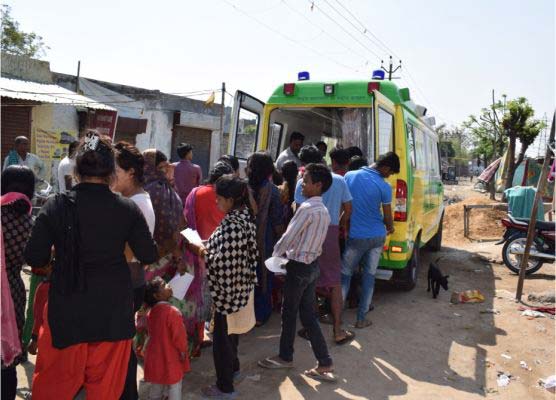Over the last two decades, Ludhiana has emerged as one of the most important industrial towns in not just Punjab, but the whole of North India. Such rapid and enormous growth of the city has resulted in migration of poor population from smaller areas of Punjab and other states like Bihar, UP, Haryana and Rajasthan in search of employment. Due to low income level and inadequate housing facilities, several slum clusters mushroomed in and around the city to accommodate the migrants. As per the provisional records in Census 2011, at least 15% of Ludhiana’s estimated population of 1.6 million live in slums; this does not include a significant number of the homeless and other people from non-notified slums who remain outside the purview of municipal records.
Absence of safe portable water, sanitation and toilets, waste collection and other civic amenities in slums have made living conditions onerous for its residents. Communicable and vector borne ailments like tuberculosis, diarrhoea, dysentery, worm infestation, malaria, typhoid, dengue, skin infection, scabies and RTI/UTI among women are common in the region. Already burdened with the worst physical environment, these slum dwellers working as daily wage labourers, rickshaw pullers, rag pickers and housemaids can hardly make ends meet let alone spend on healthcare.

In this time of need, Smile Foundation has partnered with Deutsche Bank to serve the destitute population of Ludhiana. Jugiana, Shrabha Pind, Pratappura, Jamalpur, Tajpur Road, Fatehpur and Mandi Ahmedgarh are among the 18 slum settlements in Ludhiana where Smile Foundation is rendering primary healthcare services under this intervention. Supported by Deutsche Bank, its mobile hospital programme Smile on Wheels has successfully made medical care accessible and affordable for the underprivileged families and children who are vulnerable to health risks.
Besides delivering preventive, promotive and curative services at the doorstep of beneficiaries, Smile Foundation develops a bridging network between them and the public healthcare system through referrals. Special measures are taken to reach out to the neglected strata of urban poor society through health campaigns and community meetings addressing women-related issues, such as childbirth, ANC/PNC, maternal and infant nutrition, immunization and family planning.
Several IEC activities like street plays and audio visual shows are also conducted to encourage health-seeking behaviour in people and sensitise them about basic hygiene and healthy living.
Targeting to provide healthcare services to nearly 40,000 slum dwellers in Ludhiana in a year.
Medical consultation and free medication provided during regular OPDs organized in 18 slums across the city.
Pathological lab tests conducted for blood group, sugar and diseases like tuberculosis, worm infestation, malaria, typhoid and dengue for proper diagnosis of the patients.
Filling the gap between the community and the public healthcare system, patients with serious threat to health were referred to government or charitable hospitals.
Many IEC activities were conducted to spread awareness about health risks, their cause and prevention, and importance of basic hygiene and healthcare.
Pregnant and lactating mothers were sensitised about childbirth, antenatal and postnatal care, mother and infant nutrition, breastfeeding and immunization.

IN 2014 , A TOTAL OF 12,000 PEOPLE BENEFITED FROM THE INITIATIVE

4500 STUDENTS RECEIVED BENEFIT FROM SCHOOLHEALTH PROGRAMS

OVER100 ICE ACTIVITIES WERE CONDUCTED LAST YEAR, BENEFITING MORE THAN 6500 PEOPLE

IN THE FIRST MONTH OF THE COMMENCEMENT OF THE STATIC CLINIC PROGRAM A TOTAL265 PEOPLE BENEFITED OF WHICH 57% BENEFICIARIESWERE WOMAN